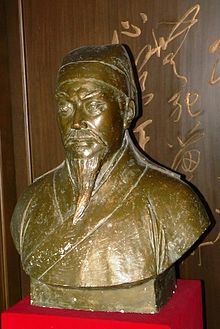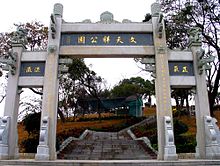- Wen Tianxiang
-
Wen Tian-xiang Duke of Xinguo Bust of Wen Tianxiang in his temple in Beijing. Born 6 June 1236
Luling, Jiangxi Province, Great SongDied 9 January 1283 (aged 46) Wen Tianxiang (Chinese: 文天祥; pinyin: Wén Tiānxiáng; Cantonese Yale: Man Tin Cheung; June 6, 1236 – January 9, 1283 AD), Duke of Xinguo, was a scholar-general in the last years of the Southern Song Dynasty. For his resistance to Kublai Khan's invasion of the Song, and for his refusal to yield to the Yuan Dynasty despite being captured and tortured, he is a popular symbol of patriotism and righteousness in China. He is considered one of three heroes of the Song's last years, alongside Lu Xiufu and Zhang Shijie.[citation needed]
His symbolic role can be seen from the following fact of 1908: in Wen Tianxiang's historical shrine in Haifeng Chen Jiongming persuaded over thirty young men of the village to swear secret support for a national revolution.[1]
Contents
Biography
Wen was born on 6 June 1236 in Luling (Ji'an), Jiangxi Province during the Song Dynasty. At the age of 18 he excelled in his local examinations, and two years later participated in examinations in the capital, during which he was personally awarded first rank by the emperor. He would subsequently take up several posts in the government of the Southern Song, including being Attendant (郎官) of the Justice Ministry and Prefect of Ganzhou.
In 1278, Wen was captured by the invading Yuan armies of Kublai Khan, "offered" a Yuan post, and ordered to convince the remaining Song forces to surrender. Wen refused both and suffered for 4 years in a military prison before his execution in 1283. During this time he wrote the famous classics "Song of Righteousness" (Zhengqige), and "Passing Lingdingyang".
Ancestry and descendants
Wen Tianxiang adopted the three sons of his younger brother when his two sons died young.
Legend has the Wen family name existing during the Western Zhou Dynasty over 3,000 years ago. Historical lineages can be documented to 1,500 years ago to Sichuan province.
There are now at least six branches of the Wen family in the provinces of Jiangxi, Hunan, Hainan, Guangdong, Fujian, and in Hong Kong and overseas locations.[2] Local dialect pronunciations would be Man (Cantonese), Vun (Hakka), and Bun (Hokkien).[2] The Man clan are considered one of the original founding families in the history of Hong Kong.
The well-known Ming dynasty painter and calligrapher Wen Zhengming also belonged to the Wen family. The mother of Mao Zedong, Wen Qimei, was a descendant as well. The majority of Wen Tianxiang's descendants still live in mainland China.
One of the oldest continuous branches of the Wen family established itself in the Hengyang/Hengshan area of present-day Hunan shortly after AD 1000. A branch of this Wen family settled in the United States in the mid-1940s and is related through marriage to the prominent Sun family of Shouxian, Anhui (Sun Jianai; Fou Foong Flour Company 福豐麵粉廠) and the Li family of Hefei, Anhui (Li Hongzhang 李鴻章).
Wen Tianxiang monuments
Jiangxi
Wen Tianxiang's hometown in Ji'an, Jiangxi honors the famous national hero with a mausoleum. Exhibitions of paintings, calligraphy, and even army uniforms supposedly left by Wen are displayed in the Wen Family Ancestral Temple in Futian. The Wen Tianxiang Mausoleum is located in Wohushan.
Beijing
The Memorial to Prime Minister Wen Tianxiang was built in 1376 during the reign of the Ming Emperor Hongwu. The location of Wen's execution is thought to be near the entrance to Fuxue Alley in the East City District of Beijing and a memorial has been established on the northern side of the entrance to South Fuxue Alley near Beixinqiao.
"The Song Dynasty's Top Ranking Scholar and Prime Minister, the West River's Filial Son and Loyal Subject," is carved into the columns of the memorial's main hall.
Taiwan
In the late 1950s and 1960s, a place called "Tapido", within the present Taroko National Park, was renamed "Tianxiang" in memory of Wen Tianxiang during the construction of the Central Cross-Island Highway. Tianxiang is now a famous resort in the east of Taiwan.
In addition, three streets also take their name from Wen (i.e. the "Tianxiang Road" ). One is in Zhongshan District, Taipei nearby the Minquan W. Road MRT Station, another is in Sanmin District, Kaohsiung and the other is in Xiulin, Hualien County.
Hong Kong
The San Tin village in the New Territories of Hong Kong, is home to many villagers surnamed "Man" in Cantonese. The "Man" villagers trace their ancestry to Man Tin Cheung via Man Tin-Sui, also a famous Song Dynasty general and the cousin of Man Tin Cheung.
A Man Tin Cheung Memorial Park and "Man" ancestral hall and residences (Tai Fu Tai) in San Tin is a popular historical attraction in Hong Kong.
Famous quotations
- 人生自古誰無死,留取丹心照汗青。-- None since the advent of time have escaped death, may my loyalty forever illuminate the annals of history.
References to Wen Tianxiang's life and poetry
- Writing Poetry as Diary: Wen Tianxiang's Poem Series Yuan-fang Tung, The Chinese University of Hong Kong
- "Writ in Blood": Wen Tianxiang's Lyric Songs Yang Ye, University of California, Riverside
- Intellectual and Aesthetic Contexts for Wen Tianxiang's Poetry Michael A. Fuller, University of California, Irvine
- Brown, William Andres (1986). WEN T'IEN-HSIANG: A Biographical Study of a Sung Patriot. Chinese Materials Center Publications. ISBN 0896446433.
- Burgess, David James (1985). WEN TIANXIANG: A Preliminary Study of his Life and Poetry (M.A. Thesis). George Washington University.
- Wan, Shengnan 萬繩楠 (1996) (in Chinese). Wen Tianxiang 文天祥. Zhonghe, Taiwan: Zhi Shu Fang 知書房出版社. ISBN 957-8622.
- Yang, Deen 楊德恩 (1939) (in Chinese). Chronological Biography of Wen Tianxiang 文天祥年譜. The Commercial Press.
See also
- History of the Song Dynasty
- List of Chinese people
- Chancellor of China
- Wang Anshi
- Sima Guang
- Fan Zhongyan
- Qin Hui
References
- ^ Leslie H. Dingyan Chen (1999). Chen Jiongming and the Federalist Movement: Regional Leadership and Nation Building in Early Republican China. Ann Arbor: Center for Chinese Studies, University of Michigan, pp 13–14
- ^ a b "Ancestry and Descendants of Wen Tianxiang". Cultural China. http://history.cultural-china.com/en/47H9352H13341.html. Retrieved 9 September 2011.
External links
Categories:- 1236 births
- 1283 deaths
- Song Dynasty chancellors
Wikimedia Foundation. 2010.



